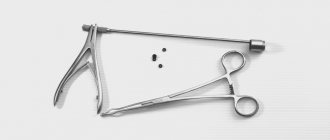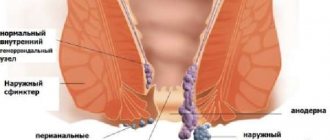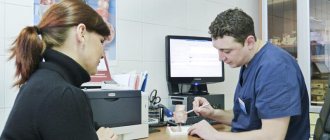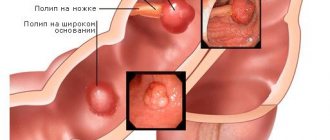What complications can there be after surgery to remove hemorrhoids?
Removing hemorrhoids is a serious operation.
Surgery to remove hemorrhoids is an extreme measure that doctors resort to in particularly difficult cases. According to statistics, surgical intervention is required only in 20% of cases, the remaining 80% can be cured with medications; in difficult cases, invasive intervention can be resorted to. It is preferable to treat hemorrhoids with medications in a timely manner, since surgical intervention is associated with complications and a long rehabilitation period.
What complications can occur after surgery to remove hemorrhoids? How long does rehabilitation take? What regimen will you have to follow after the operation? This article will answer all these questions.
What complications can occur after hemorrhoid removal?
After surgical removal of hemorrhoidal cones, it is foolish to immediately expect relief. The healing and restoration process is often accompanied by inflammation. To prevent this, it is necessary to continue treatment even after surgery. Treatment after removal of hemorrhoids involves carrying out certain procedures, for example, taking herbal baths and placing rectal suppositories, which will help the damaged areas to heal and heal faster.
Naturally, any therapy should be carried out under the supervision of the attending physician.
Complications after hemorrhoid surgery do not always appear immediately; sometimes up to several months pass before something begins to bother the person. The occurrence of complications is difficult to predict; even if a specialist performed the operation at the highest level, this is not at all a guarantee that everything will go smoothly in the postoperative period. Whether complications will appear after removal of hemorrhoids or not depends on the individual characteristics of the body, the stage of the disease, the qualifications of the specialist who performed the operation, post-operative care and much more.
Reviews from doctors and patients about the use of suppositories and ointments after surgery
Reviews from specialists about postoperative therapy for hemorrhoidal disease:
The key to complete elimination of hemorrhoids through surgery is a proper and high-quality postoperative recovery period. 7–14 days after the intervention, it is necessary to use antihemorrhoidal, anti-inflammatory and analgesic suppositories, ointment tablets. Take venotonic drugs for 30–90 days. It is also recommended to use laxatives, follow a special diet and lifestyle (surgeon-proctologist A.V. Prokofieva)
Reviews from patients about postoperative therapy for hemorrhoidal disease:
After the manipulation to eliminate hemorrhoids using the Longo method, the doctor recommended that I use Duphalac syrup, Relief Ultra suppositories and Relief Advance ointment for 5-7 days. Next, use Methyluracil ointment for 1-2 weeks after surgery to treat hemorrhoids, reviews of the use of which spoke of its high effectiveness. Take Detralex for three months and switch to a properly balanced diet. I strictly followed all the recommendations, recovery was easy and quick. I forgot about hemorrhoids. 5 years have passed since the operation (Victoria, 48 years old).
The key to successful elimination of hemorrhoidal disease largely depends on the quality of the postoperative recovery period. The patient must strictly adhere to all recommendations of the attending physician for 1–3 months after the intervention. In addition, to accelerate the processes of recovery and regeneration, eliminate pain, inflammation, bleeding, swelling, prevent the occurrence of postoperative complications and the re-formation of hemorrhoids, antihemorrhoidal drugs in the form of ointments, creams or gels, and rectal suppositories are used for 5–20 days. The use of this or that medicine is carried out as prescribed by a doctor; self-medication is unacceptable.
Hemorrhoid surgery, consequences
Under the supervision of a competent doctor, everything will go smoothly
There can be quite a few consequences, but here are the main ones:
- Pain. Unfortunately, after surgery, most people experience pain. When the anesthesia wears off, patients sometimes feel unbearable pain in the anorectal area. Doctors cope with this by using painkillers. When such drugs are not effective, narcotic drugs may be prescribed to relieve the patient's suffering. Potent medications, as a rule, quickly cope with complications after hemorrhoid surgery in the form of pain.
- Ischuria or urinary retention. This complication occurs mainly in men and is associated with epidural anesthesia. There is no need to worry about this. The symptom will go away on its own within 24 hours. To drain urine, the doctor will insert a catheter, which will be removed after the urinary process normalizes.
- Constipation. One of the most unwanted complications. By the way, constipation is possible with hemorrhoids before and after surgery. The occurrence of constipation in the postoperative period is in most cases associated with the emotional state of the patient. Often, patients cannot overcome the psychological barrier that prevents them from emptying their bowels. This is due to the fear of experiencing acute pain during the bowel movement or the possibility of infection of the sutures with bacteria. In such cases, doctors prescribe mild laxatives.
- Bleeding. Another consequence after hemorrhoid removal. Even minor bleeding that lasts for a long period of time can cause anemia in a person. If bleeding occurs, you must immediately notify your doctor so that timely action can be taken. Blood may appear due to injury to the sutures by hard feces. Sometimes bleeding occurs due to the negligence or inattention of the surgeon if he does not cauterize the removed node well. This complication after removal of hemorrhoids can be eliminated using a hemostatic sponge, which will quickly stop bleeding; it does not require removal, due to the property of self-resorption in the wound cavity. Sometimes it may be necessary to apply sutures to the damaged vessel.
- Reduction of the anal canal. A complication after hemorrhoid removal that occurs over time. This can happen due to incorrectly placed sutures by the surgeon. To correct the situation, expanders are used. In difficult situations, the patient will have to resort to the help of a plastic surgeon to eliminate complications after hemorrhoid surgery.
- Rectal prolapse. This complication is rare and, nevertheless, cannot be ignored. Bowel prolapse can occur due to damage to the nerve fibers of the rectum. You can cope with prolapse by using suppositories after removing hemorrhoids, and doing physical therapy to strengthen the pelvic muscles. If drug therapy and exercise therapy do not produce results, then repeated surgical intervention will be required. Depending on the situation, the specialist will have to excise the prolapsed fragment, suture the rectum, restore muscle tone using plastic surgery, or perform a resection of the lower segment of the large intestine.
- Fistula formation. Probably the most unpleasant of the listed complications after surgery to remove hemorrhoids. Fistulas are wounds that appear on the mucous membrane of the rectum. Bacteria enter them, and the inflammatory process begins. Over time, the wounds begin to fester.
- Suppuration of postoperative sutures. After surgery for hemorrhoids, consequences of this kind can be prevented by proper wound care and intimate hygiene. However, sometimes even the most careful hygiene cannot protect the patient from such a complication. This is due to pathogenic microflora getting on the seams. If the suppuration process is not too strong, then antibacterial and anti-inflammatory drugs can cope with this. But, if the case is complex, then you will have to resort to a repeat operation to get rid of complications after hemorrhoid surgery.
These are the main possible complications that may bother the patient after surgery. To protect yourself from this, you should know how to be treated after surgery to remove hemorrhoids, what diet to follow, what you can do and what is strictly prohibited during the rehabilitation period. All this will be explained by a specialist who treats hemorrhoids.
What to do if you are constipated after hemorrhoid surgery
Constipation after hemorrhoid surgery or constipation is a common complication experienced by a huge number of people.
Some people believe that the problem will solve itself, but it is important to understand that surgery is a serious intervention in the body, so help is needed, including medication, so that bowel movements are restored. But before treating constipation after hemorrhoid removal, it is necessary to understand the reasons that caused it. And also be aware of the danger that constipation poses to human health.
Causes of constipation
- Digestive disorders before surgery.
Constipation is one of the manifestations of hemorrhoids, which is both its cause and its consequence. After hemorrhoidal cones are removed during surgery, constipation may disappear if there is an inflammatory process in the intestinal mucosa, but this will require time and symptomatic treatment. If constipation has become one of the causes of hemorrhoids, then problems with defecation must be eliminated without fail, otherwise a relapse of the pathology will follow and surgery will be required again. - The effect of anesthesia on the body. Defecation is a process that occurs as a result of rhythmic contractions of the muscle fibers of the intestinal tissue.
Peristalsis of a healthy person occurs in different parts of the intestine at different speeds. But during anesthesia, all the muscles of the body relax, and the body needs time for peristalsis to occur again.Usually, the violation of peristalsis goes away after a few hours, so after general anesthesia, the patient is allowed to eat after 6 hours. But each person’s body is individual and reacts to anesthesia differently. The duration of anesthesia also has an impact.
- Dysbacteriosis.
After any surgical intervention, each patient receives antibacterial therapy for preventive purposes. It minimizes the risk of complications, but affects the intestinal microflora. Medicines with an antibacterial effect destroy microflora, so the intestines cannot digest food correctly.Most often this causes diarrhea, but sometimes constipation can also occur. The pathology may be accompanied by vaginal thrush.
- Bed rest.
Normal bowel movements require physical activity, which stimulates intestinal motility. In hospital settings, many people experience constipation as a result of reduced physical activity. And even if the patient had the operation on an outpatient basis, there is a high probability that he will remain in bed. - Psycho-emotional state.
Defecation after intestinal surgery can cause psychological discomfort in a person: a person may be afraid of pain or bleeding. In this regard, the patient may resist the urge to defecate, consciously or unconsciously trying to delay the time of bowel movement. This always causes constipation, so postoperative neurosis also leads to this result.
Danger of constipation
Constipation is the cause of serious discomfort, decreased performance and overall tone. Constipation is accompanied by a periodic urge to defecate, which can be painful, especially when stool accumulates. The longer a person suffers from constipation, the harder his stool becomes, and, accordingly, the discomfort in the abdominal area becomes more pronounced.
But constipation is not only an unpleasant phenomenon, but also potentially dangerous.
After surgery for hemorrhoids, constipation can be caused by the following processes:
- hard feces can damage the intestinal mucosa, which will lead to bleeding: if this happens in the rectum, a person will quickly detect this by traces of blood on paper, underwear, or in feces; but if the damage is higher, it will be more difficult to notice the bleeding, the only sign will be abdominal pain and black (not red) traces in the stool, so before diagnosis, a person may lose a lot of blood and reduce the level of hemoglobin in the blood;
- feces is a waste product of the body, so the intestinal system is designed so that feces are excreted at least once a day, so if feces are retained in the body, this causes intoxication with the corresponding symptoms: nausea, vomiting, general weakness, if intestinal obstruction occurs, it may require surgery;
- When the accumulated feces do leave the intestines, its hardness leads to damage to the delicate tissues of the rectal opening - anal fissures, through which various pathogenic bacteria enter the body.
Thus, the answer to the question of what to do if constipation after hemorrhoid surgery is to immediately begin treatment that normalizes the digestion process, peristalsis and intestinal microflora.
Treatment
To treat constipation, you need an integrated approach, which includes taking medications , therapy with folk remedies , and lifestyle correction. Treatment should always be prescribed by a doctor, but it is helpful for the patient to know how these therapies work.
Nutrition
First of all, the patient should pay attention to the drinking regime - drinking clean drinking water should be in sufficient quantities: at least 2 liters per day.
But there are exceptions to such a prescription that prevent the consumption of large amounts of fluid: kidney diseases accompanied by impaired kidney function, as well as a decrease in the production of thyroid hormones, even if euthyroidism is achieved through replacement therapy.
Secondly, you need to change your diet. Intestinal peristalsis begins the moment food enters the oral cavity. And in order to maintain peristalsis in an active state, you constantly need to eat often, but in small portions.
The menu should include products with a mild laxative effect: fermented milk products, dried fruits. It is strictly forbidden to eat foods that “fix” feces, for example, rice.
Restoration of intestinal microflora
While taking antibiotics, you should drink kefir or any fermented milk product with the prefix “bio” in the name. In most cases, this helps to avoid dysbiosis, but otherwise medications are required: prebiotics and probiotics.
Prebiotics are drugs that prepare the intestinal mucosa for “colonization” with beneficial bacteria, acidifying it (Hilak Forte).
Probiotics are medications that are directly bacteria that, by multiplying in the gastrointestinal tract, restore the digestive process (Bifidumbacterin).
It is important to understand that these types of medications are pharmacological drugs, so you should definitely consult with your doctor about the need for their use and the dosage regimen.
Laxatives
In the postoperative period, the proctologist usually prescribes to the patient by default.
This is necessary in order to make the feces as soft as possible: then, when passing through the intestines, it will not injure the mucous membrane, especially in surgical sites.
It is usually recommended to use drugs based on lactulose (Duphalac), which is not absorbed into the blood, and therefore is safe for both adults and children.
Laxatives make the process of defecation less painful, which reduces the likelihood of developing neurosis, in which a person avoids the process of bowel movement due to pain.
Physical activity
For constipation, doctors traditionally recommend increasing the degree of physical activity. But after surgery until the completion of the rehabilitation period, serious physical activity is contraindicated. But this does not mean that you cannot increase physical activity at all: regular walking at a pace that is comfortable for the person.
Source: https://cross-bones.ru/chto-delat-esli-zapor-posle-operacii-gemorroja/
What can be the consequences after the operation?
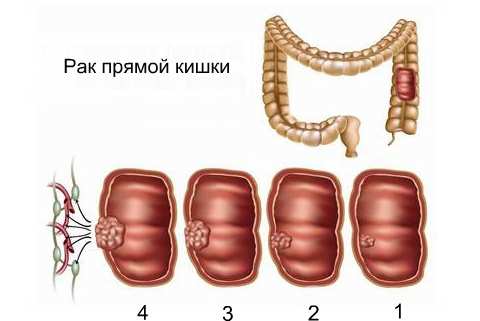
One of the most terrible consequences is colorectal cancer.
In addition to the listed complications, unpleasant consequences may also occur after surgery to remove hemorrhoids, especially for the fairer sex. So, after such an operation, polyps may appear in the rectum. If they do not cause discomfort, then they are not touched. If their appearance is accompanied by bleeding and pain, you should immediately consult a doctor so that he can take the necessary measures. What can be the consequences after hemorrhoid removal? The worst thing is the occurrence of rectal cancer. This is possible if hemorrhoids are not treated in time. The disease cannot be left to chance. In case of relapse after surgery, you should immediately consult a doctor. If hemorrhoids appear during pregnancy, you should also immediately consult a doctor to prevent possible complications during childbirth.
Treatment
Bloody discharge after hemorrhoidectomy, pain, increased temperature are signs of impending complications in the recovery period. To prevent them, medications are prescribed to achieve the following objectives:
- rapid tissue regeneration;
- relief and prevention of inflammation;
- prevention of bleeding;
- pain relief;
- anal antiseptic;
- prevention of constipation.
After hemorrhoid surgery, the ointment is used for external treatment of wounds and to prevent secondary infections. Among the drugs in the form of ointments, the following are indicated, indicated for use in the recovery period:
- Posterisan - activates local immunity, reduces inflammation, accelerates tissue regeneration and healing. Read more about Posterizan →
- Levomekol - used to prevent secondary infection, contains an antibiotic and a healing component.
- Bezornil - an ointment containing musk, zinc carbonate, pearls, amber and other components, relieves swelling, inflammation, improves blood circulation.
- Vishnevsky ointment is an inexpensive but effective drug with astringent and anti-inflammatory properties.
A week after surgery to remove hemorrhoids, doctors recommend using suppositories. They must have an analgesic and antiseptic effect. Categories of drugs used if, after removal of hemorrhoids, a lump appears or signs of inflammation are present:
- painkillers and antispasmodics - Anuzol, Nigepan, Relief, Procto-Glivenol;
- anti-inflammatory – Nurofen, Diclofenac;
- hemostatic and venotonic – Procto-Glivenol, Relief Advance;
- preventing the formation of blood clots - Hepatothrombin, Nigepan;
- antiseptic, disinfectant – Sea buckthorn, Betiol, Propolis;
- having an anti-edematous effect - Neoanuzol, Proctosan.
When the anal mucosa recovers after open hemorrhoidectomy also depends on the quality of the stool. To facilitate bowel movements, Glycerin suppositories are used to protect tissues from damage.
Among the folk remedies suitable for rehabilitation after laser hemorrhoidectomy or coagulation are decoctions of medicinal herbs and plants:
- aloe – you can make candles from the plant, prepare a decoction, squeeze the juice and prepare lotions for healing areas;
- birch tar - take 1 tbsp. l. mix the product in 2 liters of warm boiled water, take a bath until the composition cools;
- yarrow - an infusion or decoction can be prepared according to the instructions included in the box of pharmaceutical herbs;
- chamomile – 1 tbsp. l. steam the herbs with a glass of boiling water, strain, freeze in molds, and use as candles to relieve pain and inflammation.
Complications after hemorrhoid surgery
Complications after hemorrhoid surgery are possible even with the most qualified surgical intervention. The likelihood of their occurrence depends on the stage of development of the pathology, concomitant diseases, the age and general condition of the patients. Some complications may arise the very next day, others only a few weeks or even months after surgery. To prevent unwanted consequences, you must strictly follow all doctor's instructions.

Anemia often occurs after hemorrhoid surgery and manifests itself in the form of dizziness.
Complications after hemorrhoid removal
Healing of injured tissue occurs simultaneously with the residual inflammatory process, so radical treatment methods are most often associated with pain and side effects. No surgical intervention can bring instant recovery - after surgery you always need to go through a recovery period.
Its course and duration depend on the severity of the disease, the method of surgical manipulations and the quality of their implementation, and the patient’s accuracy of compliance with the prescribed regimen. After removal of hemorrhoids, the final stage of treatment of the disease should be carried out under the supervision of a proctologist in order to minimize the risk of numerous complications.

After removal of hemorrhoids, the final stage of treatment of the disease should be carried out under the supervision of a proctologist in order to minimize the risk of numerous complications.
Severe pain syndrome
There are many nerve plexuses in the anal area, so after surgery, when the anesthesia wears off, severe pain occurs. It can bother the patient for one or two weeks, this is within acceptable limits. If pain in the anal area persists longer, you need to check whether any complication has appeared.
Anemia
Even mild anal bleeding after surgical removal of hemorrhoids leads to a drop in hemoglobin levels in the blood. Due to lack of oxygen, all tissues of the body suffer. Iron deficiency anemia develops, which can be recognized by a state of weakness, dizziness, tachycardia, increased sweating, and decreased blood pressure. Over time, it can cause a stroke or myocardial infarction.
Rectal prolapse
Rectal prolapse is a consequence of damage to the nerve endings and muscle fibers of the rectum during surgery. The painful area of the anus swells greatly. It is possible to cope with prolapse by using suppositories after removing hemorrhoids and doing physical therapy to strengthen the pelvic muscles. If suppositories and exercises do not help, repeat surgery is necessary.
Acute thrombosis
When venous blood in the nodes stagnates and thickens, clots form that completely clog the cavities of hemorrhoidal formations. The skin around the anus often becomes inflamed. Patients experience unbearable pain.
If acute thrombosis is accompanied by severe bleeding, emergency surgery is required.
Necrosis
When hemorrhoids fall out and become pinched during defecation, blood circulation in them is disrupted. Tissues deprived of nutrition begin to die. Signs of such a complication are a bluish-purple color of the nodes due to stagnation of blood and acute pain.
Paraproctitis
This is a disease in which, after surgery, an abscess can develop near the anus - an extremely painful suppuration. Paraproctitis can be acute and chronic. Its symptoms are severe redness, swelling, and purulent discharge. A fistula may form. Paraproctitis can only be eliminated surgically.
Fistulas
They can form due to improper surgical manipulations during surgery if infected muscles are caught when sutures are applied. This complication may appear several weeks or even months after discharge from the hospital. Antibacterial drugs most often do not help, and the area of suppuration has to be opened.
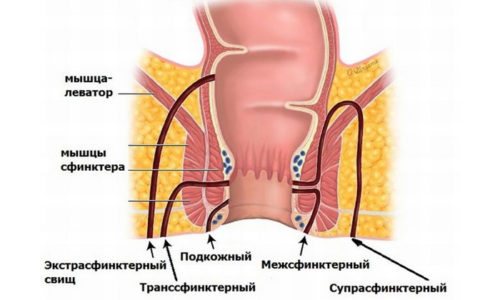
Fistulas can form due to incorrect surgical manipulations during surgery if infected muscles are caught when sutures are applied.
Bleeding
It may appear a few days after surgery, when bowel function is restored. If the feces are hard, they injure the stitches that have not yet had time to heal. Another possible reason for this complication is insufficient cauterization of the vessel. Bleeding that lasts more than 3-4 days cannot be tolerated; it is a dangerous symptom. Formed polyps can also bleed. You should see a doctor immediately to rule out colorectal cancer.
Recurrence of hemorrhoids
Despite the removal of hemorrhoids, some of the degenerated tissues with cavities (caves) remain. Therefore, after surgery, the possibility of relapse of the disease cannot be excluded. Due to heavy lifting, prolonged sedentary work, constipation, and diarrhea, hemorrhoids can develop again. According to medical statistics, if minimally invasive treatment methods are used (photocoagulation, sclerotherapy), relapses of the disease occur in every second patient, and with transanal resection this risk is minimized.

Heavy lifting can cause hemorrhoids to reoccur.
Suppuration of wounds
This complication after surgery occurs when surgical sutures become infected. If the suppuration is local, they try to eliminate it with antibiotics and anti-inflammatory drugs. But sometimes you have to open the abscess, process the tissue and re-stitch it.
Urinary dysfunction
This is a mild complication that occurs more often in men who receive an epidural (injection into the lower back). Problems with urination occur on the first day after surgery and soon disappear on their own. You can insert a catheter, the need for which will disappear in a day or two.
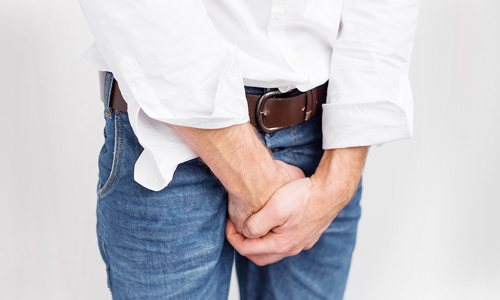
Problems with urination occur on the first day after surgery and soon disappear on their own.
Constipation
Almost all operated patients experience fear of upcoming bowel movements due to pain and put off going to the toilet. However, under no circumstances should you be constipated. In addition to the psychological attitude, laxative products and medications help normalize stool after surgery.
Treatment of complications of hemorrhoids
After surgery it is recommended:
- adhere to bed rest for 3-4 days;
- regularly treat seams;
- maintain personal hygiene;
- avoid sudden movements;
- avoid constipation or diarrhea;
- use an orthopedic pillow during sedentary work;
- start doing light sports only with a doctor’s permission;
- have sex 3-4 weeks after surgery.
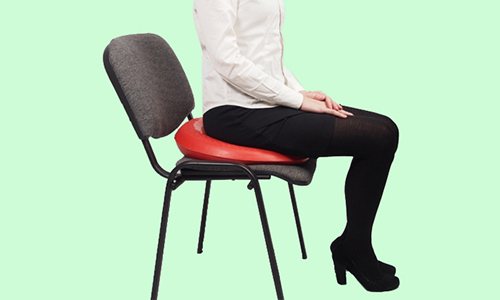
After surgery, it is recommended to use an orthopedic pillow during sedentary work.
- to relieve severe pain - painkillers: suppositories with belladonna, novocaine, Anestezol, Bezornil ointments, Diclofenac injections, Detralex tablets, Ibuklin, Nise, Pentalgin;
- to prevent bleeding - Relief suppositories and ointments, ice compresses;
- to relieve inflammation - drugs Proctosedil M, Procto-Glivenol;
- for healing wounds resulting from surgery - Natalsid, Posterisan, Methyluracil.
Possible complications after surgery
In some cases, side effects are observed during the postoperative period. They can appear immediately after surgery, or several weeks or even months later. Let's look at the most common complications after hemorrhoid removal:
- Severe pain. There are a lot of nerve endings in the anorectal area, so after the anesthesia wears off, the patient experiences pain. In people with hypersensitivity, the pain syndrome is unbearable and can only be relieved with the help of narcotic analgesics. It is worth noting that pain during closed hemorrhoidectomy is more pronounced than during open hemorrhoidectomy. Taking analgesics lasts the first day or two.
- Urinary retention. This side effect is more common in male patients in the first 24 hours after surgery. Peridural anesthesia increases the risk of this complication. To remove urine, catheterization of the bladder is done.
- Fear of pain. Often after surgery, the patient begins to experience fear of possible pain, as a result of which stool retention develops. In this case, the patient is prescribed a special laxative diet and laxatives. Also, to reduce pain during defecation, it is possible to use analgesics or 0.2% nitroglycerin ointment, which relaxes the anal sphincter.
- Bleeding. The opening of bleeding is possible both immediately after the end of the operation, and several days after it as a result of injury to the mucous membrane at the site of the sutures by dense masses of feces or due to the formation of cracks. Bleeding may also be caused by a blood vessel that was not sufficiently cauterized during hemorrhoidectomy. When the thin crust falls off, the wound becomes open. This complication is eliminated by using a hemostatic sponge, a tampon soaked in adrenaline, or suturing the damaged vessel.
- Narrowing of the anus. Stricture (narrowing) of the anal passage is formed as a result of incorrectly applied sutures after the Milligan-Morgan operation. The defect is corrected by using special dilators, and in the case of severe stricture, by means of plastic surgery.
- Rectal prolapse. Impaired functioning of the anal sphincter is a fairly rare complication. Rectal prolapse is usually caused by damaged neuromuscular fibers in the rectal wall. Treatment of the disease can be carried out using both conservative and surgical methods.
- Postoperative fistulas. A purulent abscess develops over several months. The reason for the formation of fistulas lies in the capture of muscle fibers during the application of surgical sutures, followed by infection, melting of tissue and the appearance of canals from the rectum. First, a conservative type of treatment is used, and if there is no progress, surgical treatment is used.
- Suppuration. If pathogenic microbes enter postoperative wounds, suppuration begins. They get rid of it with antibacterial and anti-inflammatory drugs. In advanced cases, it is necessary to open the area of suppuration.
The rehabilitation period after the elimination of hemorrhoids is on average 4-5 weeks. If complications occur, recovery occurs after a longer period of time.
General rules for the postoperative period
The recovery plan is always selected by the doctor. If everything goes according to plan, then the patient quickly returns to normal life, and remembers the operation as a planned event that is not associated with special suffering.
Recovery after hemorrhoid surgery involves a whole range of recommendations, which in each individual case will be supplemented by individual comments, but are generally universal.
General recovery principles:
- The patient remains in the hospital for at least 5 days under constant medical supervision;
- On the first day he does not eat anything (only drinks) so that there is no stool and associated damage to the sutures;
- The patient must observe strict bed rest for at least a week;
- Dressings of the operated area should be regular and systematic, using those ointments and products prescribed by the attending physician;
- After discharge, you need to be treated at home for about 2 weeks (sick leave is extended) following the same recommendations;
- Walking is possible only after discharge from the hospital and in a moderate mode;
- Do not lift heavy objects under any circumstances! Physical activity is unacceptable for several months after surgery;
- Postpone sports activities for at least 3 months, strength training for at least six months;
- Use special pillows at your workplace (a proctologist will tell you more about whether you need them specifically and where to get them);
- A ban is imposed on recreation in conditions of high temperatures (bath and sauna, hot resort);
- A special diet and nutritional regimen are not even disputed - you need to be fundamentally strict with this, not to give yourself any concessions;
- Carefully monitor the hygiene of the operated area. You cannot experiment with hygiene products - do not introduce anything new (the only thing you were missing was an allergy at the site of a healing wound). Avoid toilet paper completely - only wet wipes, or better yet, just thoroughly rinse with cool water after each bowel movement;
- You should not return to sexual life earlier than 3-5 weeks after surgery (the period varies from person to person).
The list seems impressive, but in fact there is nothing impossible or very difficult here - a matter of habit and self-discipline.
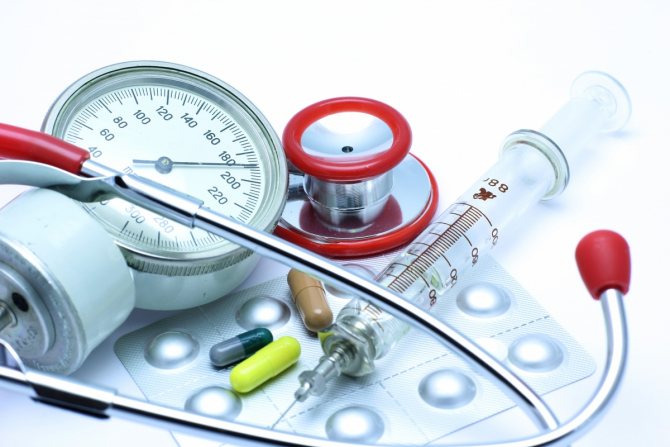
During the operation, the patient is positioned on his back with his legs raised wide apart. Hair in the perineum and perianal area is removed in advance, and the skin is treated with antiseptics.
At the initial stage, the anal passage is widened to provide free access to the hemorrhoids, after which an anoscope is inserted into the rectum. Using instruments, the nodes are pulled out to ligate the node stem by suturing the vessel. If bleeding occurs or to prevent it, electrocoagulation, an ultrasonic scalpel or a laser can be used. Only after this the node is excised.
Next, the doctor uses antiseptics again, and if bleeding occurs, additional vein ligation or the use of a tampon with adrenaline may be required.
Most patients experience fairly severe pain after hemorrhoid surgery. This is considered normal given the scale of the intervention. Also, in isolated cases, patients may experience other complications such as:
- feces and urine retention;
- fecal incontinence;
- formation of anal fissure;
- inflammatory process.
To avoid such complications, patients must strictly follow the recommendations given by the doctor, which will facilitate the postoperative period and serve for a faster recovery.
On average, the rehabilitation period after hemorrhoidectomy lasts from 3 to 5 weeks, depending on the type of operation used. At this time, the final restoration of the mucous membrane of the rectum and anus occurs. To make it as short as possible and reduce the likelihood of relapse of the disease, it is recommended to monitor the regularity of bowel movements, follow a diet, and use a set of medications to eliminate discomfort and quickly heal wounds.
What medications can be used during the recovery phase after a hemorrhoidectomy:
- Analgesics in the form of tablets, ointments or rectal suppositories. The most effective in this regard are considered to be analgesics in the form of tablets and ointment forms.
- In the presence of sphincter spasm, it is recommended to use nitroglycerin cream, nifedipine ointment, and antispasmodics.
- Wound-healing local remedies in the form of ointments and suppositories, the use of sitz baths and lotions is allowed. Doctors call the most effective drugs Vishnevsky ointment, antibacterial ointments, methyluracil ointment (the drugs Aurobin, Methyluracil, Hepatrombin, Relief and Posterisan are not used).
- In some situations, tableted antibacterial drugs are prescribed.
Experts recommend using tablets, suppositories and ointments after hemorrhoid surgery for at least 3 weeks or as long as symptoms persist.
To restore stool, patients are prescribed laxatives: Duphalac, Fitomucil, Fitolax, preparations with senna. Their use may not be necessary if you strictly adhere to the diet that is prescribed to all patients without exception after surgery.
Risk of pathogenesis after removal of nodes using different methods
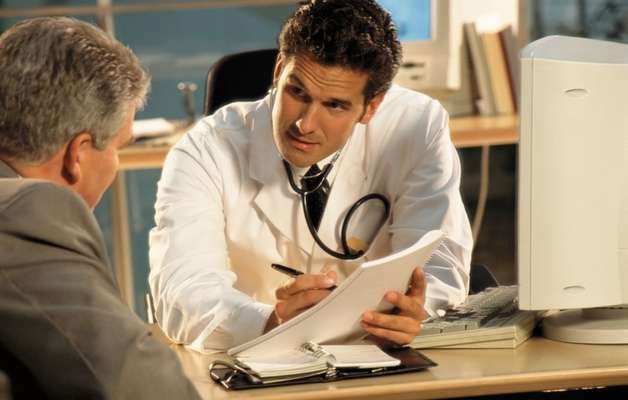
At the same time, one third of those operated on have to return to the doctor with the problem of prolapsed nodes. The pathogenesis of hemorrhoids is easily explained by the modern theory, which states that during surgery most of the cavernous tissue remains in place. Long-term exposure to various unfavorable factors (constipation, excessive physical activity, sedentary work) leads to inflammation and enlargement of the nodes. At the same time, ligation of nodules results in a favorable outcome for some patients. The consequences after removing hemorrhoids of any stage using the Milligan-Morgan method are practically insignificant, and therefore relapse of the disease in this case is very unlikely. In the postoperative period, there is not even a loss of reflex functions during defecation, which always accompanies ordinary hemorrhoidectomy.
After latex ligation, some discomfort may be observed for 7-10 days after the procedure. One of the most effective treatment methods is transanal disarterization. This procedure is virtually painless. After it, pain relief must be done only for two to three days.
The recovery process after surgery using the Longo method lasts 3-4 days. During this period, pain and discomfort during bowel movements are noted. If the patient also has hemorrhoids on the outside, the rehabilitation period can last 2-4 weeks.
Organization of the recovery period
In order to accurately answer how long recovery after hemorrhoid surgery lasts, the attending physician must know the type of intervention performed, its volume, as well as the presence of concomitant diseases in the patient.
The rehabilitation period after this type of treatment should always include the following points:
- Changing lifestyle and physical activity.
- Selection of the optimal diet.
- Rational use of medications that improve recovery.
- Maintaining hygiene rules.
On average, postoperative treatment of hemorrhoids and recovery are delayed by 4-6 weeks for open types of surgery, and 2-4 weeks for closed types of surgery .
Lifestyle change
The recovery period after hemorrhoid surgery necessarily includes the patient's compliance with several recommendations that change over time.
- the first two weeks after surgery, the patient must strictly adhere to bed rest . If this recommendation is not followed, the risk of developing a relapse of the disease increases several tens of times;
- the first 6-9 days after surgery, the patient should stay in a medical institution for timely detection of possible complications of the treatment, as well as other undesirable reactions of the body. During this period, ointments against pain and microorganisms, as well as accelerating the healing of soft tissues (Methyluracil, Levomekol, etc.), are actively used.
After two weeks of bed rest and discharge from the hospital, a second appointment is made with the attending physician , who evaluates the results of the operation.
- Very often, patients ask questions: when can they sit down and start walking? As a rule, sitting on the bed is allowed for 2-4 days after treatment, but walking is best after 7-10 days;
- any intense physical activity, such as going to the gym, is allowed after 3 months in the absence of contraindications;
- visiting baths and saunas during the rehabilitation period is strictly prohibited;
- restoration of full functionality occurs in the 5th week of rehabilitation. It is during this period that a person can return to active work.
Compliance with these recommendations allows you to prevent early relapse of the disease and improve the patient’s quality of life.
General recommendations for patients
Recovery after hemorrhoid removal varies from person to person. Regardless of all other factors, there are general recommendations for all patients who have undergone surgery, which will help to quickly return to work capacity and good health.
The first day after hemorrhoidectomy, it is better to fast so as not to provoke a bowel movement. On the second and subsequent days, foods that do not cause fermentation and gas formation are prescribed. Food should be balanced and nutritious, not causing bloating and not interfering with wound healing. You need to eat 5-6 times a day in small portions.
It is prohibited to consume alcohol, coffee, carbonated drinks, whole milk, legumes, spicy and fatty foods, smoked foods, herbs and spices.
Drinking plenty of fluids is recommended. The volume of liquid required per day, including soups, should be calculated at the rate of 400 ml. per 10 kg of weight.
It is recommended to include foods rich in fiber in your daily diet: oatmeal and buckwheat porridge; vegetables in fresh, stewed and canned forms; bran bread; nuts. When planning a menu, you need to wisely combine high-fiber dishes with carbohydrate, protein and plant foods.
Rehabilitation after hemorrhoid removal will be easier and faster if you follow a diet. The list of acceptable products includes: crumbly porridge from buckwheat and millet, lean meat, fermented milk products, vegetables and fruits. Dishes must be boiled, steamed or stewed. The diet is followed throughout the entire recovery period and the next 2 months.
During the rehabilitation period, heavy physical activity is not allowed. Lifting heavy objects is prohibited. At the same time, you can and should regularly perform simple therapeutic exercises and move more.
Every time after defecation, which should occur 1-2 times a day, it is imperative to follow the natural rules of personal hygiene.
Nutrition
Constipation after hemorrhoid surgery is a common cause of complications. Therefore, patients are prescribed a special diet that stimulates intestinal motility. Despite the fact that therapeutic nutrition limits the consumption of many foods and dishes, it must be rich and contain the substances and vitamin complexes necessary for the body.
How long it takes for hemorrhoids to heal after surgery depends on following the recommended diet. First of all, the patient must consume fresh dairy products, vegetables and fruits. They contain fiber necessary to improve the digestibility and processing of food. Another important point is fractional meals. It is recommended to eat 5-6 times a day, in portions not exceeding 200 ml.
In the first 24 hours after hemorrhoid removal, you must completely avoid eating. In subsequent days, the diet is expanded gradually to avoid damage to the anal mucosa by hard feces. What you can eat during the rehabilitation period:
- porridges and soups from cereals - buckwheat, oatmeal, millet;
- fermented milk products - low-fat sour cream, one-day cottage cheese, kefir, yogurt;
- lean meat;
- vegetables - beets, broccoli, carrots, pumpkin;
- vegetable oil (olive, sunflower);
- fruits and berries from which the seeds have been previously removed.
We must not forget about maintaining a drinking regime - you should drink 1.5-2 liters of liquid per day. These can be fruit drinks, clean water, compotes, green tea, and decoctions of medicinal herbs. Cooking food by frying is prohibited. It is better to bake, boil or steam foods.
What foods should you avoid after hemorrhoid surgery:
- sausage, frankfurters;
- ready-made sauces;
- spicy seasonings;
- fatty dairy and meat products;
- strong meat broths;
- fast food;
- carbonated drinks;
- mushrooms;
- alcohol;
- baking and baked goods;
- pickles and marinades.
Complications after hemorrhoidectomy from non-compliance with nutritional rules often occur, so eating the right food and correct heat treatment of foods is a big contribution to avoiding the consequences of the intervention.
When is surgical treatment necessary?
In the early stages of development, pathologies are usually limited to drug therapy, which is aimed at blocking symptoms. Typically, creams and rectal suppositories are used for this, which can reduce the activity of the inflammatory process, relieve pain, normalize blood circulation and tone the veins.
Sometimes, if you have constipation, medications that have laxative properties are prescribed.
More than 30 years of my practice have shown that there are no miracles in the treatment of hemorrhoids, and at the same time, there are remedies that can help many people with this delicate problem.
In advanced stages of hemorrhoids, surgery is necessary. Basically, the surgical method of eliminating hemorrhoids is used in the presence of rectal prolapse, thrombosis, the development of necrosis of hemorrhoidal cones, the active development of the inflammatory process, as well as bleeding. In the presence of any of the listed pathologies, the procedure for removing hemorrhoids is mainly carried out.
In 80% of cases, patients are prescribed minimally invasive treatment due to its gentle effects on the human body. The group of minimally invasive methods includes:
- carrying out infrared coagulation;
- sclerotherapy;
- ligation of hemorrhoidal cones with latex rings.
In the remaining 20% of cases, hemorrhoidectomy is used.
Postoperative complications
Depending on the stage of the pathology, complications may develop after hemorrhoid surgery. Also, the risk of complications after surgery increases under the influence of the patient’s age and the general condition of his body.
Hemorrhoids are a serious disease that causes a lot of anxiety, fortunately, there are remedies that help both relieve symptoms and help heal. One of them .
Young people tolerate operations more easily, and consequences after removal of hemorrhoids rarely develop. And in old age, unpleasant consequences occur quite often. How long will it take for the consequences to appear?
Complications after surgery to remove hemorrhoids can appear either immediately after the procedure or after some time.
Doctors say that hemorrhoid surgery, the consequences of which can be extremely serious, can cause the following.
- Active development of pain syndrome. This complication appears due to the localization of a large number of nerve endings in the anal area. Severe pain begins to spread immediately after the anesthesia wears off. If the patient has a low pain threshold, the painful sensations become unbearable and interfere with the patient’s normal life activities. In this case, doctors prescribe powerful analgesics. How long does the treatment last? Such drugs are prescribed for several days to reduce pain and alleviate a person’s condition.
- Psychological complications. Surgical treatment can lead to the patient's fear of pain. Such fears become the causes of delayed bowel movements, and then constipation. To eliminate this problem, laxatives are prescribed for a short time in combination with analgesics.
- The appearance of urinary retention. This consequence of the procedure is observed in men on the first day after surgical treatment. During this period, the patient should be under close supervision of a qualified physician. To eliminate this pathology, bladder catheterization is used.
- Opening of bleeding. Pathology usually develops a couple of hours after the procedure. This is often preceded by several reasons. Basically, bleeding occurs due to poor cauterization of the pathological vessel, damage to the rectal mucosa by feces, and the appearance of anal fissures. If such an alarming symptom as bleeding is detected, the cause of the bleeding is examined and diagnosed, after which appropriate therapy is prescribed.
- A few months after the hemorrhoid has been removed, a fistula sometimes appears. The reason for this complication is suturing wounds after surgery in the wrong way. If the fistula is not treated in time, infections will soon join it, which will contribute to the development of a strong inflammatory process. This pathology is eliminated using a conservative method with the help of medications. If such treatment is ineffective, operations are prescribed to remove the fistula.
- Mucus in the rectal area begins to be produced in increased quantities. Due to the fact that mucus is actively secreted from the anal ring, its mucous membrane begins to be in constant irritation. If mucus constantly covers the anal area, its area and perineum begin to become covered with erosions. It is worth considering that mucus is released accompanied by itching. Due to constant damage to the skin and mucous membranes, pus begins to appear, so this condition requires conservative drug therapy.
- Sometimes surgery can cause a narrowing of the anal canal. This pathology appears after improper suturing after a couple of months. This consequence is removed with the help of special expanders or during plastic surgery.
- Sometimes there are cases of prolapse of the rectum. This consequence is provoked by damage to the neuromuscular fibers. In the presence of pronounced symptoms, the pathology is eliminated through surgery. In the presence of sluggish symptoms, a conservative technique is used.
- Pus may appear in the wounds. This consequence develops due to the presence of a large number of pathogenic microorganisms in the rectal area. Microorganisms penetrate a fresh wound, which provokes the development of an active inflammatory process and suppuration appears. If pus begins to cover the wound, it is recommended to open the abscess and clean it out. Next, the pus is completely removed with the help of antibacterial drugs. This complication must be treated, since pus can cause infection of other tissues.
Constipation after hemorrhoid surgery: causes and effects, treatment, diet
Problems with bowel movements after surgical treatment of hemorrhoids are common. It is important to achieve normalization of stool after surgery, since constipation negatively affects the general condition and leads to damage to the sutures and anal bleeding. To do this, they include softening foods in the diet, use traditional methods and take medications.
Constipation is common after surgical treatment of hemorrhoids.
Causes
Surgery is associated with stress and anxiety. Due to psychological disorders, chaotic muscle contractions occur. As a result, peristalsis worsens. Difficulty in emptying may occur even before the procedure and persist during the rehabilitation period.
Also, constipation after hemorrhoid surgery occurs for other reasons:
- Use of painkillers and anesthesia. Toxic substances slow down all metabolic processes, which causes fecal stagnation. The drugs can be eliminated from the body within a month.
- Formation of adhesions. As a result of tissue scarring, compactions occur that prevent normal emptying. In some cases, partial or complete obstruction develops.
- Inactivity. After surgery, it is necessary to limit physical activity to prevent damage to postoperative sutures. If not excision was carried out, but complete removal of the nodes with part of the mucous membrane, this period may take 2-3 weeks. Due to the lack of movement, digestion processes slow down and the movement of feces worsens.
Surgery is associated with stress and anxiety. Due to psychological disorders, chaotic muscle contractions occur. As a result, peristalsis worsens.
Effect on the human body
The accumulation of feces in the intestines leads to the following consequences:
- With stagnation, toxins are absorbed by the mucous membranes. Harmful substances enter the blood. This leads to poisoning. The patient feels weak, has headaches, and loses his appetite. Later, as the condition worsens, vomiting and insomnia occur.
- With difficulty passing through the intestines, stool becomes dry and hard. Due to stagnation, the volume of feces increases. As a result, the masses damage the mucous membranes, causing them to stretch and deform. Constipation can lead to rupture of the walls and bleeding.
- Untimely and difficult emptying is accompanied by the formation of anal fissures. They further impair peristalsis due to emotional disorders. The risk of secondary infection increases.
What to do
To relieve constipation after hemorrhoid surgery, you must take medications and follow a diet. After the doctor's permission, folk remedies and abdominal massage are used. The simplest option is stroking clockwise. To improve digestion, do a light massage 2-3 times a day.
Drug treatment
Glycerin suppositories are used to facilitate bowel movements. The active ingredients gently envelop the walls and help stool move more easily through the intestines. Due to the protective layer, the mucous membranes are less damaged during defecation. Laxative suppositories contain additional irritating components that cause evacuation.
If the use of suppositories is not possible, it is allowed to take laxatives (Regulax, Duphalac). Depending on the drug chosen, you can achieve a quick effect or mild relief of constipation. However, priority is given to diet, since medications are a temporary solution.
Glycerin suppositories are used to facilitate bowel movements.
Folk remedies
- Tansy decoction.
Disinfects damaged tissues and promotes wound healing. 10 g of raw material is poured into a glass of boiling water and placed on low heat for 5 minutes. Then the dishes are covered with a lid and wrapped in thick cloth. After cooling, the drink is filtered and diluted with water to restore the original volume. The decoction is used to treat the anus and make lotions. The drink should not be taken internally, as it has astringent properties. - Aloe juice.
Moisturizes tissues, accelerates regeneration processes and softens feces. Large leaves of mature (over 3 years old) plants are suitable for obtaining liquid. The juice is used to create lotions or taken orally 1 tsp. up to 3 times a day. Aloe thins the blood, so it can be used as a laxative only after the tissue has healed. - Honey. Fresh product makes defecation easier and improves peristalsis. To obtain a laxative effect, you need to drink 1 tbsp. l. honey with a glass of warm water. You can use honey along with diluted aloe juice.
Aloe juice moisturizes tissues, accelerates regeneration processes and softens feces.
Diet food
Meals for constipation after surgery should be fractional. It is important to follow the schedule, because the internal organs get used to the regime and secrete more digestive juice and enzymes. This makes the digestion process easier. You should not overeat, as large portions cause deformation of the mucous membranes and contribute to stagnation.
Preference is given to products of plant origin. They are easier to digest. Later, lean meat and lean fish are introduced into the menu. Vegetables and fruits should contain soluble fiber. Coarse fibers damage the walls, so their share in the menu must be reduced. Gentle heat treatment and thorough grinding will help partially neutralize the negative impact.
After the operation, you should temporarily avoid those foods that cause fermentation and gas formation. These include peaches, cherries, grapes, etc. Dried fruits have a laxative effect, but they need to be introduced into the menu gradually, because they can also cause bloating.
It is important to drink at least 2.5 liters of water per day. When there is a lack of fluid, the body is forced to conserve moisture. First of all, this concerns discharge – urine and feces. Feces become dry and hard, which leads to constipation and damage to the mucous membranes.
Finding the nearest clinic Find the clinic closest to your home in your city
Source: https://asosudy.ru/gemorroj/zapor-posle-operacii
Relapses
Hemorrhoids may appear again after surgery. Recurrent disease usually develops 5-10 years after surgical treatment. There are many factors that can repeatedly cause hemorrhoids.
- Constant constipation. Such disturbances in the process of bowel movement provoke injury to the intestinal walls with solid particles of feces, and also irritate the anus.
- A sedentary lifestyle contributes to the appearance of stagnant processes in the pelvic organs.
- Regular work with heavy objects, as well as grueling physical activity, provoke blood stagnation in the rectal area.
- Pregnancy and childbirth. Women experience constipation while carrying a baby, which provokes the development of hemorrhoids. During childbirth, a woman’s pathology may enter the acute stage due to the fact that the expectant mother is pushing hard.
- Poor nutrition, based on insufficient consumption of fiber and large amounts of protein, provokes disruptions in the digestive process, which affects the ability to timely empty the intestines.
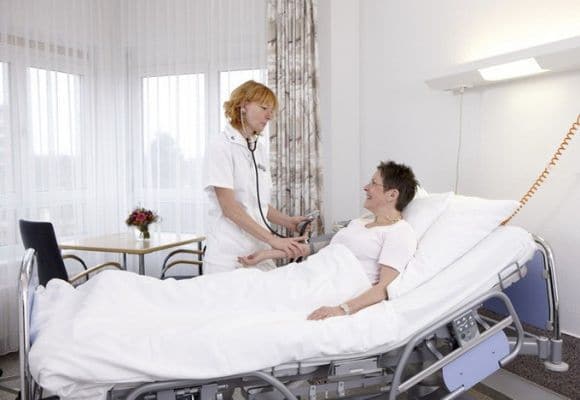
Rehabilitation
How long does rehabilitation last after hemorrhoid removal? Typically, the rehabilitation period takes 30 days, however, with the development of postoperative consequences, this period expands, as required by the treatment of the developed pathology. It incapacitates a person, since for effective therapy it is necessary to follow a certain regimen and diet.
The developing pathology after surgery can be judged by the presence of the following symptoms:
- significant increase in temperature;
- the presence of unquenchable pain;
- the appearance of pus and bleeding.
The patient should know that after the operation he has eliminated only the consequences of the disease, without affecting the cause of the pathology. Therefore, everyone should adjust their lifestyle to prevent the development of dangerous complications and relapses. Proper nutrition, giving up bad habits and moderate physical activity will help you maintain your health.

